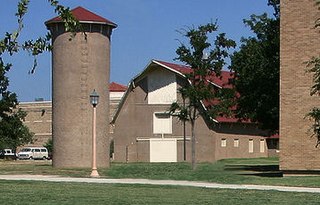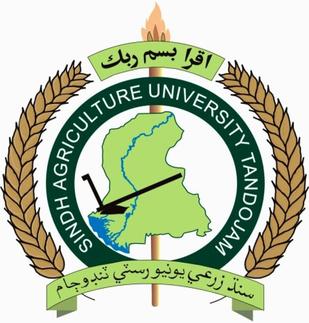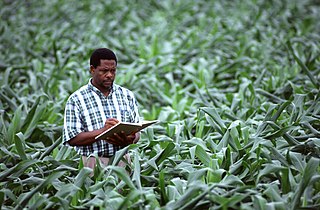
Horticulture is the art and science of growing plants. This definition is seen in its etymology, which is derived from the Latin words hortus, which means "garden" and cultura which means "to cultivate". There are various divisions of horticulture because plants are grown for a variety of purposes. These divisions include, but are not limited to: gardening, plant production/propagation, arboriculture, landscaping, floriculture and turf maintenance. For each of these, there are various professions, aspects, tools used and associated challenges; Each requiring highly specialized skills and knowledge of the horticulturist.
The College of Agricultural and Environmental Sciences (Ag&E) is one of four colleges of the University of California, Davis. Established in 1922, it offers degrees in 27 undergraduate majors and thirty-three graduate groups. As of January 2014, the College has been overseen by Dean Helene Dillard.

Bangladesh Agricultural University, abbreviated as BAU, was established in 1961. It is the first agricultural university and also the second largest public university of Bangladesh. This university is located in Mymensingh. The university has 44 departments.
A soil conditioner is a product which is added to soil to improve the soil’s physical qualities, usually its fertility and sometimes its mechanics. In general usage, the term "soil conditioner" is often thought of as a subset of the category soil amendments, which more often is understood to include a wide range of fertilizers and non-organic materials. In the context of construction soil conditioning is also called soil stabilization.

Tamil Nadu Agricultural University (TNAU) is the state agricultural university of Tamil Nadu whose Headquarters is situated in Coimbatore, Tamil Nadu, India.

Agricultural education is the systematic and organized teaching, instruction and training available to students, farmers or individuals interested in the science, business and technology of agriculture as well as the management of land, environment and natural resources.

Sindh Agriculture University, is situated in Tando Jam town of Hyderabad, on Hyderabad-Mirpurkhas highway and is about 200 km (120 mi) from Karachi airport linked with super highway to Hyderabad.

Assam Agricultural University (AAU) is an agricultural education state university which was established on 1 April 1969 in Jorhat in the state of Assam, India. The jurisdiction of the university extends to the entire State of Assam with regard to teaching, research and extension education in the field of agriculture and allied sciences. The university has a number of campuses with its headquarters at Borbheta, Jorhat.Assam Assembly Passes Veterinary And Fishery University Bill The Assam government has decided to form a new university by merging the existing veterinary colleges in the state and the fishery college at Raha.This new University will consist of five Krishi Vigyan Kendra's viz., Kamrup, Barpeta, Baksa, North Lakhimpur and Morigaon under it and the two research stations viz., Mandira and Byrnihat.

An agriculturist, agriculturalist, agrologist, or agronomist is a professional in the science, practice, and management of agriculture and agribusiness. It is a regulated profession in Canada, India, the Philippines, the United States, and the European Union. Other names used to designate the profession include agricultural scientist, agricultural manager, agricultural planner, agriculture researcher, or agriculture policy maker.

The Stockbridge School of Agriculture offers Associate of Science, Bachelor of Science, and graduate degrees as an academic unit of the University of Massachusetts Amherst campus. It was founded as part of the Massachusetts Agricultural College in 1918.

Sokoine University of Agriculture (SUA) is a public university in Morogoro, Tanzania, specializing in agriculture. The university is named after the country's second prime minister Edward Sokoine.

A weed is a plant considered undesirable in a particular situation, growing where it conflicts with human preferences, needs, or goals. Plants with characteristics that make them hazardous, aesthetically unappealing, difficult to control in managed environments, or otherwise unwanted in farm land, orchards, gardens, lawns, parks, recreational spaces, residential and industrial areas, may all be considered weeds. The concept of weeds is particularly significant in agriculture, where the presence of weeds in fields used to grow crops may cause major losses in yields. Invasive species, plants introduced to an environment where their presence negatively impacts the overall functioning and biodiversity of the ecosystem, may also sometimes be considered weeds.
The College of Agriculture and Life Sciences is one of eight colleges at Virginia Tech with a three-part mission of learning, discovery, and engagement and it is one of the best agriculture programs in the nation. It has more than 3,100 undergraduate and graduate students in a dozen academic departments. In 2013, the National Science Foundation ranked Virginia Tech No. 6 in the country for agricultural research expenditures, much of which originated from the College of Agriculture and Life Sciences.
North Carolina State University's College of Agriculture and Life Sciences (CALS) is the fourth largest college in the university and one of the largest colleges of its kind in the nation, with nearly 3,400 students pursuing associate, bachelor's, master's and doctoral degrees and 1,300 on-campus and 700 off-campus faculty and staff members.
The University of Maryland College of Agriculture and Natural Resources is the agricultural and environmental sciences college of the University of Maryland and operates the Maryland Sea Grant College in cooperation with the University of Maryland Center for Environmental Science and the National Oceanic and Atmospheric Administration.

The BYU College of Life Sciences was originally named the College of Biology and Agriculture. It was formed in 1954 from the division of the College of Applied Science into this college and the College of Family Living, which was a partial predecessor of the College of Family, Home and Social Sciences. While the Agronomy; Horticulture; Animal Husbandry; Industrial Arts and Drawing; and Bacteriology programs all came from the College of Applied Science the Botany; and Zoology and Entomology programs came from the College of Arts and Sciences. Thomas L. Martin was the first dean of the College of Biology and Agriculture. In 1954 the Agricultural Economics Department was moved from the College of Commerce to the College of Biology and Agriculture.

Mustafa Kemal University, abbreviated as MKU, is a public university established 1992 at Antakya, Hatay Province in southern Turkey. It is named after the founder of the Turkish Republic, Mustafa Kemal Atatürk.

Vietnam National University of Agriculture, until 2014 Hanoi University of Agriculture (HUA), is an education and research university specializing in the agricultural sector. The university is located in Trau Quy town, Gia Lam district, a Hanoi suburban area, about 12 km far from Hanoi city centre.

Agricultural technology or agrotechnology is the use of technology in agriculture, horticulture, and aquaculture with the aim of improving yield, efficiency, and profitability. Agricultural technology can be products, services or applications derived from agriculture that improve various input and output processes.

The Lilongwe University of Agriculture and Natural Resources (LUANAR) is a university outside Lilongwe, Malawi. It was formed in 2011 by a merger between Bunda College of Agriculture of the University of Malawi and Natural Resources College (NRC).












